Class Supply Examples
This page gives visual examples of some supplies. Note-only one small section here says ” basic required”. Please check each class list to see which supplies are needed for the class you are taking. I use a variety of different paint companies
Basic Required Supplies For Every Class
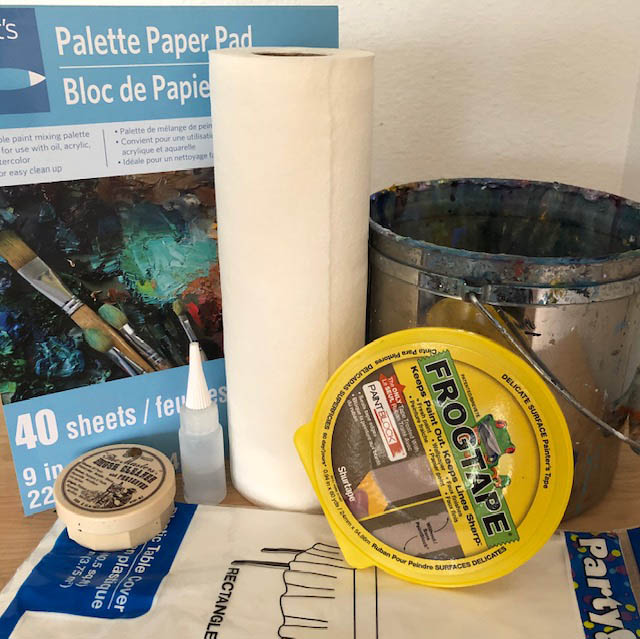
- a water bucket
- paper towels (important)
- a charcoal stick or pencil, an eraser
- plastic tablecloth (dollar store)
- easel (optional)
- a chip brush (dollar store)
- Palette paper, angled palette knife (not flat)
- small ruler, pencil, practice paper
- artist’s tape
- scissors
- seas sponge, small round yellow sponge (pottery sponge)
- When painting with oil you will not need a water bucket or spray bottle
- Paint – Amsterdam paints – depends on the class
- Canvas – size depends on the class, mostly 16″ x 20″
- Brushes- depend on the class – they will be listed (do not buy brushes in packages)
- I use 5 brushes 1″ wash brush, a liner brush, a very small fan brush, and most importantly a flat acrylic brush from Princeton.
Acrylic Paints That I Use Often
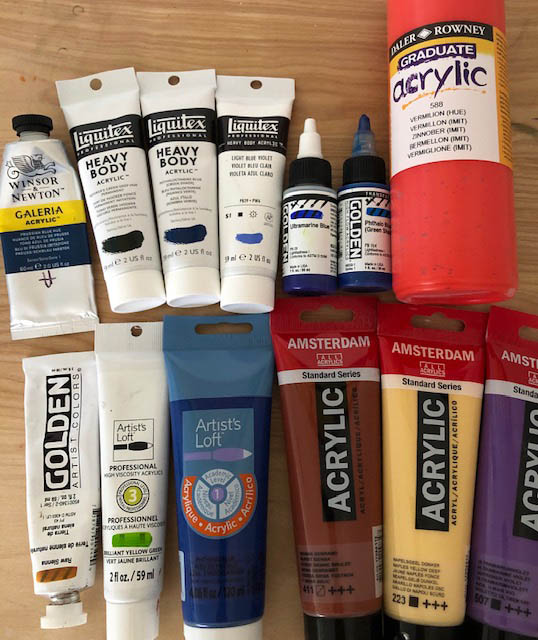
- Paint Companies (Brands- Do not buy- Craft paint, any Grumbacher, Liquitex Basics, or paint in a flip-top bottles)
- Excellent paint is listed below:
- Amsterdam Paints (tubes) Any size- excellent paint – I use this most of the time
- Liquitex Heavy Body– Liquitex Heavy Body Paint -heavy body – hooker green deep hue- (looks black, not green when you open the tube), alizarin crimson
- Golden Acrylic tubes and Some High Flow Bottle Paints– phthalo blue-green shade
- Daley Rowney squeeze bottles-orange or red-orange for a base coat or use as regular paint (strong vivid orange or vermillion)
- Artist Loft -bottle of white acrylic
Acrylic Mediums
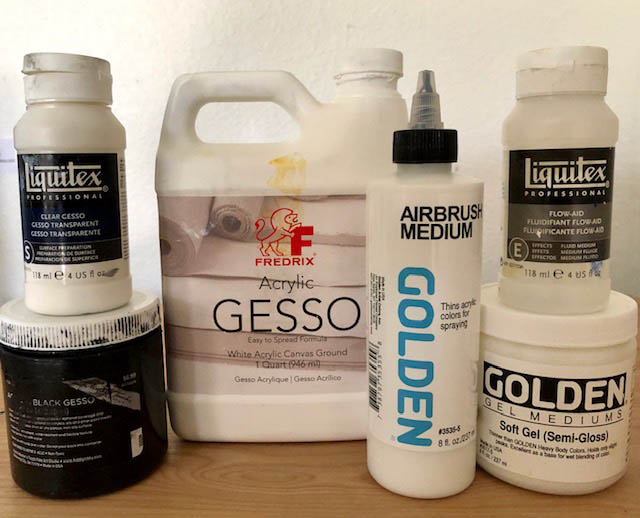
- Gesso -Fredricks Gesso, any black gesso, Liquitex clear gesso (for locking in marks abstracts and switching from acrylic to oil), Bob Ross white Gesso is good for acrylic or oil (excellent)
- Acrylic Mediums– Liquitex -clear gesso, Golden Brand- self-leveling gel, acrylic glazing medium, or any acrylic medium (matt or gloss)
- Airbrush Medium– (thinner)
- Liquitex Flow Aid– (thinner)
Oils – Paint
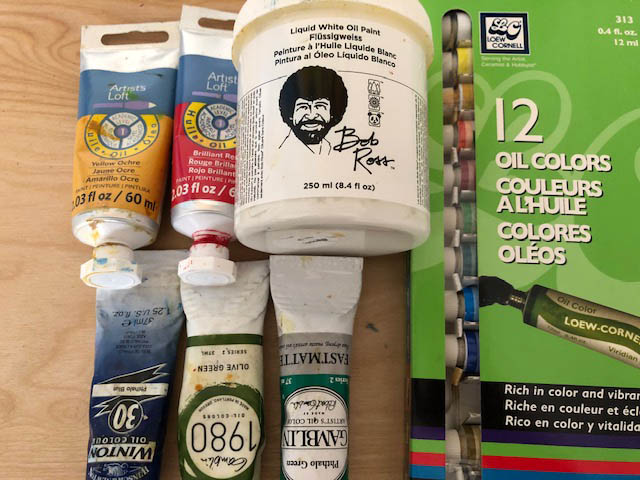
- Specific likes- Bob Ross gesso and white paint has an excellent unique formula
- Basic colors- Titanium White, Mars Black, ultramarine blue, red, yellow
- Additional colors -Titanium white, Cobalt teal, Phthalo blue, Transparent red oxide, Burnt umber, Raw sienna, qin Magenta, Lemon yellow, red, Yellow ochre, Ultramarine blue, Veridian
- Paint Companies (Brands) -Serious Painting- I am showing you paint to see if you like to oil paint. If you decide that you like it stick to one brand as much as possible.
- Pure oil painting requires the following: paint, specific mediums, and clean-up materials. Check with each class for specifics.
Oil Mediums
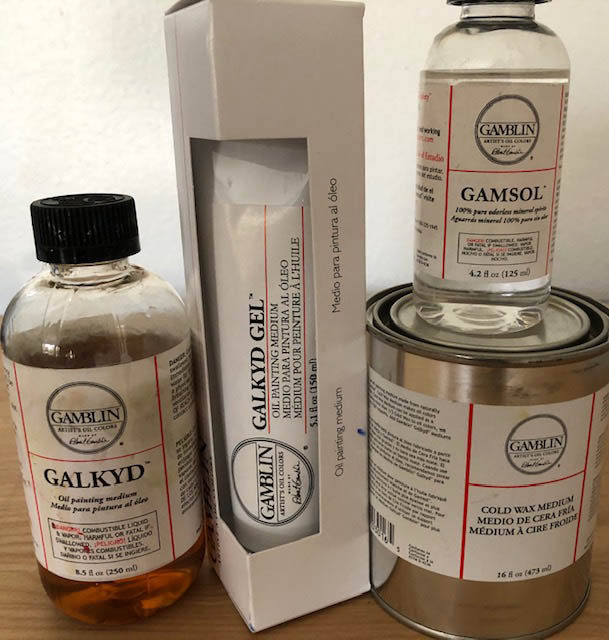
- Galkyd Gel in a tube medium ( a must for cold wax abstract painting)
- Galkyd Liquid oil paint medium – (advanced abstract classes)
- Gamsol Liquid thinner – all oil painting
- Cold Wax Medium – (advanced abstract classes)
- Winsor Newton Liquin Original – for seascapes
- Winsor Newton Fine Detail – for seascapes
- Winsor Newton Impasto – seascapes
- Walnut Oil or Safflower oil and a container for cleanup is a must
Oil Tools -For Cold Wax Painting Classes
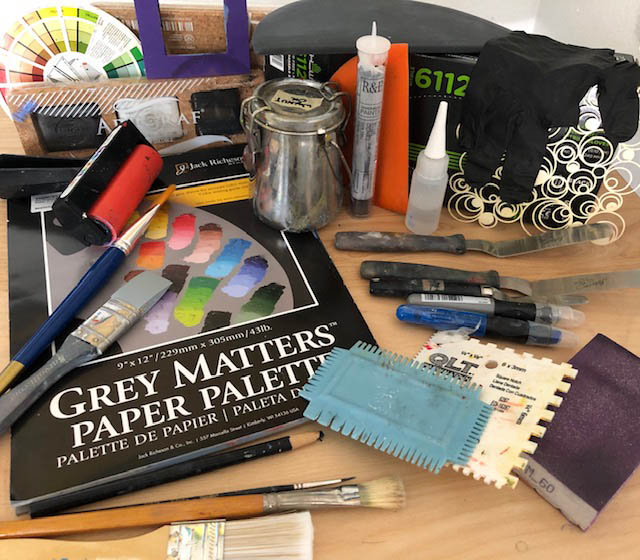
- Clean Brushes As You Paint– Small Safflower Oil or Walnut Oil (no sunflower or other oils)
- Bring a container – made to clean brushes with Gamsol
- Tools– Palette Knives ( not flat) – At least 3 for mixing, at least one must be metal in the abstract class.
- Paper Towels -important
- Gloves– disposable
- Palette Paper– preferably grey
- Brushes– brushes need to be kept separate from your acrylic brushes
- Silicone Scrapers– flat 6″ can be used with any paints
- Surfaces- use any of the surfaces listed (note that there is a difference between oil paper and watercolor paper)
- Marking Tool– R& F pigment stick or Marbu art crayon or Artgraph square (optional)
- Stencil
- Sanding block
Surface To Paint On

- Canvas (any size) -I often use 16 x 20 in class
- Ampersand Board – ( med in size, not the tiny one)
- Canvas Board (Canva Pad is one optional)
- Plain WoodBoard or Cradle Board (If you choose this put a good coat of gesso on it before class. Let dry completely)
- Paper– (It looks like watercolor sheets 20 x 30 but is made for oil. It is heavier for abstract painting.)
- Paper Requirement- (If you use paper make sure it is taped down to a board before class)
Tools
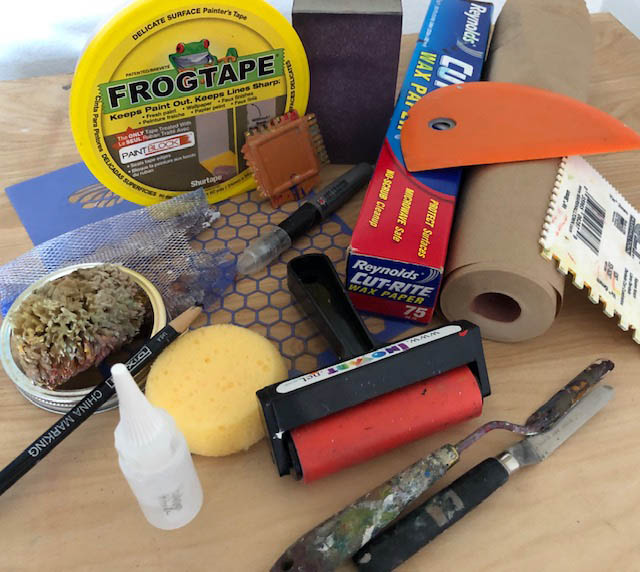
- Stencils, homemade or bought
- Tape (Frog brand tape or Artist tape)
- Sponge– round yellow pottery sponges, and a sea sponge
- Palette knife not completely flat (metal)
- Sample Practice Paper (any type of paper)
- Paper –wax paper, or rice paper(for collage), or brown craft paper
- Palette Paper – grey or white (grey works for oil or acrylic)
- Silicone Scraper– complete flat ( for abstract classes 6″)
- Brayer
- Any Marking Tool -charcoal, black pencil, carpenter’s pencil, pastel stick
- Squeeze Bottle -very small needle tip empty ( a brand is Darice)
- Sanding Block (fine for acrylic, course for oil)
Brushes – Acrylic

- a square brush that comes to a chiseled flat edge (e.g. Bright #8 Princeton 6300B )
- angled brush (e.g. Princeton angular bright 6300 AB 6) – optional
- a tiny fan brush (for seascapes)
- a round thin point paintbrush (for detail)
- a soft wash brush. (e.g. Princeton 1″ #4050W – clear handle) ***
- 2″ chip brush from Lowes or DK ($2)
- Script brush or liner brush (longer thin floppy hair)
- you can bring random brushes in addition
- Glue brush-silver metal handle (automotive brush -use for glue in gold leaf painting)
- You will use a different set of brushes for oil painting- see specific class

If you are local – DK Art Supply on Hwy 441 Leesburg, FL – 352-326-9555, usually has everything and Dennis or Gail will make a package for you. Just say you are taking Arrachme’s classes. (past the airport and Comcast)
